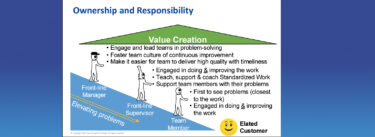Using the experience of GE Appliance and other manufacturers, LEI CEO John Shook reminds lean thinkers that much remains to be written in “manufacturing’s next chapter,” its resurgence in North America.
The resurgence of manufacturing in the US is welcome news but there are important lessons behind the headlines, according to John Shook, chairman and CEO of the Lean Enterprise Institute (LEI), and the author of two influential books explaining how manufacturing companies can use lean management to dramatically improve.
Shook offered lessons about cultural change in the rise, fall, and resurrection of some significant manufacturing sites, such as GE’s appliance manufacturing facility in Kentucky.
“At GE Appliance Park operation in Louisville, they decided to not just “reshore” but to “right shore” and “lean shore,” Shook told 2,400 lean management practitioners during his keynote address at the recent Association for Manufacturing Excellence (AME) conference in Toronto. Shook, author of Managing to Learn and co-author of Learning to See, noted that lean initiatives there began in 2009, following broad speculation that Appliance Park would be shed by GE.
Thanks to cross-functional teaming and lean practices in their first lean operation, Louisville employees have reduced inventory by 60%, boosted labor effectiveness 30% and cut time to produce 68%, said Shook. Physical plant transformation and social transformation reflect insights gained from Herman Miller, Autoliv and NUMMI. The insights include the use of such concepts as a “big room,” (multiple functions working together in a central location to design new products) and the “little big room,” (a cross-functional team designing a new plant management system). These practices strengthen the operation as people gain needed understanding about how to do their jobs, and it becomes hard to do a job the wrong way, said Shook.
Appliance Park recently celebrated its revitalization with employees and the local community, also marking its 60th anniversary. GE has invested $1 billion at Appliance Park, in turn creating several thousand jobs since 2010 and a string of market-leading product successes. Two new plants, two rebuilt facilities and refurbished operations have greatly expanded its capacity for production of hybrid water heaters, bottom freezers, dishwashers, high-efficiency top load washers as well as front load washers and dryers.
Join the Manufacturing Renaissance
“It’s manufacturing’s next chapter — the future of manufacturing in North America,” according to Shook. “In North America, we’ve decided to return our attention to manufacturing.” He invited conference participants to “join in the renaissance” adding, “We’re out to change the world and make it a better place through lean thinking and practice.” Although he believes that some battles have been won through this approach, Shook acknowledged that “there’s much more to be done” and called for learning and informed action on several fronts:
- The swing to outsourcing and then back to “insourcing” highlights the need to reflect on “right sourcing,” Shook said. Such shifts prompt the question for manufacturing’s senior leadership: Where is the best place for this product to be made? “As we bring manufacturing operations back, it’s important to do it the right way, the lean way,” said Shook. “We need to recognize the value stream as a series of tight connections with potential for learning and improvement, not as discrete transactions.”
- How can lessons learned at NUMMI and other plants shape our thinking about cultural change? What understanding and action can turn disengaged employees into productive, involved workers? “We can make sure workers understand that they don’t have to “stink” or produce bad work — with proper training and a supportive system, anyone can learn to be successful,” said Shook.
- When a manufacturing operation has been off-shored and then later starts to come back, the character of the organization has changed and critical capabilities will have been lost. What is the best way to identify and re-acquire needed skills?
- Problems happen. “What do we do with them? Do we learn from them? Replace reactive firefighting with the 5 Whys, proactive target experimentation and open innovation exploration, suggested Shook. Work on all levels within the organization, from the macro enterprise level to the value stream level and the factory and individual job levels.
Shook described a lean transformation model as a situational approach that accommodates situational problems and continuing change, Shook said. Leader standard work sets the tone for organization-wide, clear definitions of roles and responsibilities. Process improvement reflects continuous, practical changes to create better ways of getting things done. Meanwhile, capability development in all organizational levels supports sustainable improvement and innovation.
To create sustainable change, continually ask key questions, counseled Shook: What is the purpose of our work? What problem are we really trying to solve? How are we improving our actual work? How are we building needed capabilities? What is the role of leadership? Then, as you gain understanding, continue the quest for new learnings.





